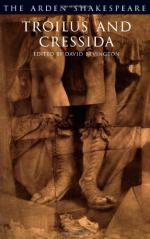|
This section contains 11,158 words (approx. 38 pages at 300 words per page) |

|
SOURCE: “The Gastric Epic: Troilus and Cressida,” in Shakespeare Quarterly, Vol. 48, No. 3, Fall, 1997, pp. 295-313.
In the following essay, Hillman contends that Shakespeare wrote and produced Troilus and Cressida with a view to concentrating on the grossly physical aspects of the human body in order to bring life to a tale that had already been frequently told and whose language had thus been rendered abstract through overtelling.
Ignorance in physiologicis—that damned ‘idealism.’
Friedrich Nietzsche, Ecce Homo1
1. the Matter of Troy
Why did Shakespeare write Troilus and Cressida? Why, that is, did he turn his attention to a story that was so overdetermined as to have become, by the end of the sixteenth century, little more than a compilation of clichés? The Trojan story was enormously popular during the decades preceding composition of the play,2 and the most obvious motive suggested by this popularity is the play's...
|
This section contains 11,158 words (approx. 38 pages at 300 words per page) |

|


